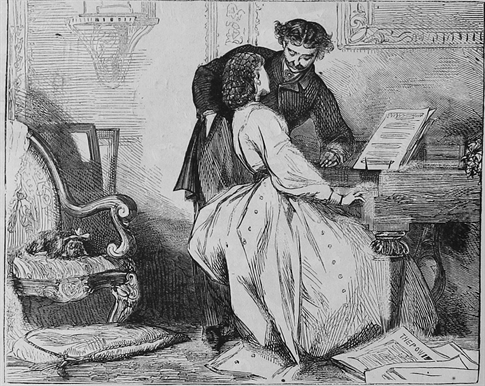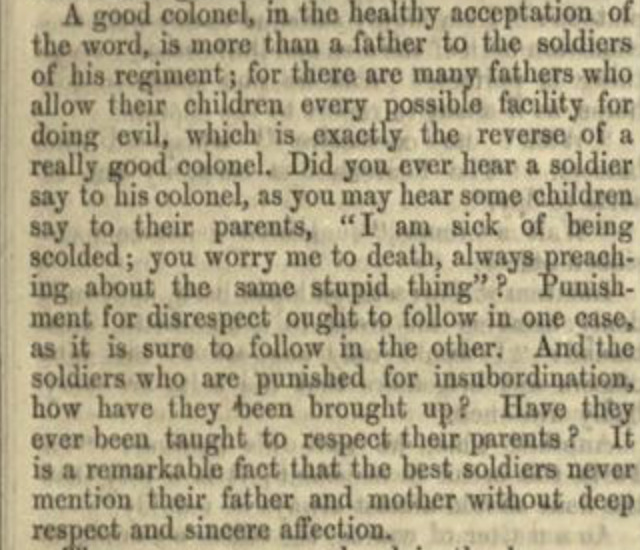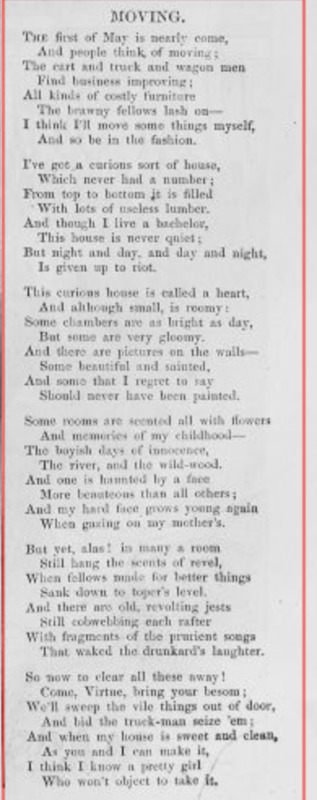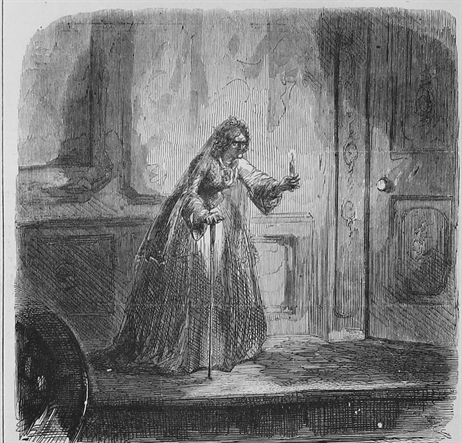Part 23
In Charles Dickens’ Great Expectations, the relationship between Estella and Miss Havisham is depicted as a rather complicated and deceiving bond. While Miss Havisham claims to protect Estella from the dangers surrounding love and relationships with men, Estella eventually grows to become a heartless and cold creature incapable of accepting and giving love. Within part 23 of Harper’s Weekly edition of Great Expectations, Dickens highlights the complicated relationship Miss Havisham and Estella share due to the parenting style of Miss Havisham and because of her desire for revenge; he emphasizes how her overprotection of Estella blinds her to the realities and possibilities of love and marriage. The placement of the literature and images within Harper’s Weekly edition of Charles Dickens’ Great Expectations is used to illuminate the significance of preserving female innocence and purity in the 19th century and how this preservation affected the life of women within the Victorian period.

DANGEROUS!
The illustrations and literature works surrounding the publishing of part 23 of Dickens’ novel highly influence the ways in which the reader perceives the chapter. The works accompanying the chapter during the May 4th period focused mainly on the ideals surrounding the concept of purity and the angelic, innocent woman. They also highlighted how strict parental control is needed to protect women. On May 4th Harper’s Weekly published an image titled “DANGEROUS!” The image depicts a woman playing the piano for a man who stands closely over her, staring at her with a look of fancy, illustrating an intimate form of contact. Initially, when one views this image, one wonders why the image is titled as dangerous, but upon analyzing the chapter in Harper’s Weekly of Great Expectations, it is clear that there is a common theme imposed that reflects the importance of preserving a woman’s innocence and virtues during this period. Estella and Miss Havisham argue over how Miss Havisham’s attempt at supposedly “protecting” Estella by keeping her away from men and teaching her to be untouchable results in Estella’s stance on love and marriage ending up completely tainted and ruined. Estella highlights how Miss Havisham “brought up [her] adopted daughter wholly in the dark confinement of these rooms” and taught Estella “that there was such a thing as daylight, but that it was made to be her enemy and destroyer, and she must always turn against it, for it had blighted [Miss Havisham] and would else blight [Estella]” (Dickens 332). This quote ties in directly with the image posted in Harper’s Weekly as Estella accuses Miss Havisham of ruining her conception of love and how although Miss Havisham wanted to protect Estella, she raised her in isolation and taught her never to accept true love from men because they were painted as “dangerous” due to Miss Havisham’s own tragic experience. Miss Havisham creates a narrative for Estella instilling that men are dangerous and will “destroy her” and taint her purity and innocence. However, due to this narrative, Estella has become entirely numb to the idea of love and rejects Pip’s genuine affection. In their article, Maria Ioannou highlights how Pip desires Estella “for what she is: a sexual and fallible human being,” and viewing Estella as this “sexual being” implies the “dangers” Miss Havisham ultimately wants to protect Estella from, she wants to protect her from tainting her purity and image (Ioannou 144). Pip, like the man in the image, is painted as “dangerous” because he has the power to break Estella’s heart and rob her of her innocence.

Grand Godard
The second work of literature published in the All The Year Round edition of Great Expectations was the short story titled “Grand Godard.” This work of literature emphasized the significance of parenting and how frequently colonel’s treated their soldiers like their children. Regardless of how much they scold these soldiers, the soldiers never complain. The story mentions how “the best soldiers never mention their father and mother without deep respect and sincere affection,” regardless of the challenging treatment the parent imposes on the child (All The Year Round 127). This concept of parenting and children holding nothing but deep respect for their parents directly relates to Estella’s behaviour towards Miss Havisham in part 23. When Estella and Miss Havisham are arguing, Miss. Havisham says that Estella has a “cold, cold heart!” and Estella responds by saying, “What? Do you reproach me for being cold? You?” with an attitude of indifference (Dickens 330). This quote highlights how although Miss Havisham is upset with Estella and talks down to her, Estella is indifferent to this belittling and stands her ground against Miss Havisham. She does the opposite of what a “good child” described in the story “Grand Godard” is meant to do; instead of respecting Miss Havisham, Estella eventually lashes out at her and blames her for whom Estella has now become. The overall relationship between Miss Havisham and Estella can also be compared to that of a colonel and soldier. Although there is no motherly and daughterly love between the two, Miss Havisham still cares for Estella despite her cruel portrayal of it. She raises her like a soldier to protect her from the dangers that come with love and marriage. Their relationship can also be compared to a colonel and soldier as Miss Havisham raises Estella to avenge her and break the hearts of men the same way Miss Havisham had once had her heart broken; colonel’s train their soldiers to fight, Miss Havisham has raised Estella for vengeance. Although Miss Havisham wants to protect Estella from the hardships she experienced growing up, “the mothers story has been inscribed on the daughters life, [and] between them there is a nightmare bond” that cannot seem to be fixed due to Miss Havisham’s own struggles with her past traumas (Ioannou 145).

MOVING
The poem “MOVING” was also published the week part 23 of Great Expectations was published. The poem focuses on a man's heart, and he compares his heart to a home that has been vacant for a while. He uses the concept of the home as a metaphor for his heart and mentions how he has found “a pretty girl who won’t object to take [his heart]” and stay in his home (Harper’s Weekly 279). The addition of this poem to this week’s publishing is quite a coincidence as it relates pretty well with Pip’s affection for Estella. This theme of love is recurring and again links back to the idea of the pure and innocent woman. The poem sets the reader up for Pip’s eventual love confession; however, as highlighted before, Estella does not accept this confession as she is numb to the idea of love. This concept of rejection again ties in with how Miss Havisham wants to protect Estella. Dickens focuses on how a woman’s purity and innocence “was symptomatic of a general social attitude; for on a woman's purity was thought to depend the health of the home and of society” (Ioannou 145). Victorian life was shaped around traditional gender roles, and a woman was ideally meant to be the angel of the home, sexually and morally pure, unless she was married; hence why Miss Havisham attempts to teach Estella that she must remain pure and untouched. This poem particularly sets the reader up for Pip’s affectionate reveal and how Estella cannot accept it due to Miss Havisham’s teachings and because of the importance of purity. She mentions how “when [Pip] says [he loves her], [she] knows what [he] means as a form of words; but nothing more” to her, Miss Havisham has painted love as nothing more than false hope and lies (386). Although Pip truly loves Estella, she is a Rapunzel character trapped away. Although the poem and Pip confess a genuine desire, this desire is ultimately unattainable due to the gender expectations at the time and how Estella was raised.

She Carried a Bare Candle in Her Hand
The final image highlighting the significance of part 23 of Great Expectations is the image titled “She Carried a Bare Candle in Her Hand” in Harper’s Weekly. In this image, a woman is depicted looking rather grim and ghost-like; she appears to be in a wedding veil and dress while holding a candle. The woman seems older as she holds a cane in her other hand. This image is interesting as it seems to be a direct portrayal of Miss Havisham as she, too, carries a cane in the novel and never takes off her wedding attire. Havisham is described as wearing “a long white veil… with bridal flowers in her hair” while she sits in her satin white wedding dress (Dickens 92). The woman in the picture appears to be wearing the same outfit and looks melancholy and frail. This image emphasizes how after her heartbreak, Miss Havisham was never truly the same, and this idea ties in with how when the innocence and purity of a woman is lost through loss in marriage or through heartbreak, it results in the fall of a woman, and Miss Havisham herself is a product of heartbreak. The woman in the image appears to be lonely, like Miss Havisham and “although Miss Havisham is not portrayed as evil, the tragedy of her life [and] the effect she has on Estella is a criticism of the confines which restricted women to a life centered on feeling” (Ioannou 145). This early tragedy Miss Havisham experiences leaves her with a life centered on feelings of heartbreak and desire for revenge, and because of this desire for revenge, she ruins the idea of love and marriage for Estella. In a sense, while trying to protect Estella from having her innocence and purity tainted, Miss Havisham takes away Estella’s innocence. She numbs her to the joys of love, which ultimately results in the loneliness and misery of Miss Havisham.
To conclude, although Miss Havisham attempts to protect Estella from the same tragedies she had once gone through, she fails to provide Estella with a life where she can enjoy the innocent joys of pure love. Although during the Victorian period, a woman’s entire life depended on preserving her purity and innocence, Miss Havisham’s desire for revenge creates a loss of Estella’s innocence surrounding the idea of marriage. Estella is ultimately unable to accept love because of how she is raised and because Miss Havisham kept her locked away from the world and prevented her from experiencing love beyond just words. The placement of the images and literary works within Harper’s Weekly edition of Charles Dickens’ Great Expectations emphasizes the importance of the untouched, angelic woman and changes how the reader perceives the significance of preserving female innocence and purity in the 19th century.
Works Cited
Dickens, Charles. Great Expectations, edited by Graham Law e. al, Broadview Press, 1998.
IOANNOU, MARIA, and Maria Ioannu. “‘[S]imply Because I Found Her Irresistible’: Female Erotic Power and Feminism in ‘Great Expectations.’” Dickens Quarterly, vol. 29, no. 2, 2012, pp. 142–50. https://ucalgary.primo.exlibrisgroup.com/permalink/01UCALG_INST/15o3ob6/cdi_chadwyckhealey_abell_R04699258
“Dangerous!” Harper's Weekly, vol 5. no. 227, May 1861, pp. 278-279. https://ezproxy.lib.ucalgary.ca/login?url=https://search.ebscohost.com/login.aspx?direct=true&db=h9k&AN=66766722&site=ehost-live&kw=true&acc=false&lpId=divl15&ppId=divp6&twPV=&xOff=0&yOff=0&zm=fit&fs=&rot=0&docMapOpen=true&pageMapOpen=true
“Grand Godard” Dickens Journal Online, vol. 5. no. 227, May 1861, pp. 127-128. https://www.djo.org.uk/all-the-year-round/volume-v/page-127.html
“Moving” Harper's Weekly, vol. 5, no. 227, May 1861, pp. 279-280. https://ezproxy.lib.ucalgary.ca/login?url=https://search.ebscohost.com/login.aspx?direct=true&db=h9k&AN=66766721&site=ehost-live&kw=true&acc=false&lpId=divl17&ppId=divp7&twPV=&xOff=0&yOff=0&zm=fit&fs=&rot=0&docMapOpen=true&pageMapOpen=true
“She Carried a Bare Candle in Her Hand” Harper's Weekly, vol. 5. no. 227, May 1861, pp. 286-287. https://ezproxy.lib.ucalgary.ca/login?url=https://search.ebscohost.com/login.aspx direct=true&db=h9k&AN=66766704&site=ehost-live&kw=true&acc=false&lpId=divl20&ppId=divp14&twPV=&xOff=0&yOff=0&zm=fit&fs=&rot=0&docMapOpen=true&pageMapOpen=true